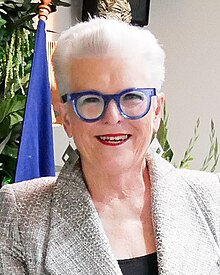
Back Jenny Shipley Afrikaans جيني شيبلي Arabic جينى شيبلى ARZ Jenny Shipley AST Джэні Шыплі Byelorussian Jenny Shipley Catalan جێنی شیپلی CKB Jenny Shipley German Jenny Shipley Esperanto Jenny Shipley Spanish
Dame Jenny Shipley | |
|---|---|
 Shipley in 2020 | |
| 36th Prime Minister of New Zealand | |
| In office 8 December 1997 – 10 December 1999 | |
| Monarch | Elizabeth II |
| Governor-General | Michael Hardie Boys |
| Deputy | Winston Peters Wyatt Creech |
| Preceded by | Jim Bolger |
| Succeeded by | Helen Clark |
| 28th Leader of the Opposition | |
| In office 10 December 1999 – 8 October 2001 | |
| Prime Minister | Helen Clark |
| Deputy | Wyatt Creech Bill English |
| Preceded by | Helen Clark |
| Succeeded by | Bill English |
| 8th Minister for State Owned Enterprises | |
| In office 16 December 1996 – 8 December 1997 | |
| Prime Minister | Jim Bolger |
| Preceded by | Philip Burdon |
| Succeeded by | Tony Ryall |
| 32nd Minister of Health | |
| In office 29 November 1993 – 16 December 1996 | |
| Prime Minister | Jim Bolger |
| Preceded by | Bill Birch |
| Succeeded by | Bill English |
| 19th Minister for Social Welfare | |
| In office 2 November 1990 – 29 November 1993 | |
| Prime Minister | Jim Bolger |
| Preceded by | Michael Cullen |
| Succeeded by | Peter Gresham |
| Member of the New Zealand Parliament for Rakaia Ashburton (1987–1990) | |
| In office 15 August 1987 – 27 July 2002 | |
| Preceded by | Rob Talbot |
| Succeeded by | Brian Connell |
| Personal details | |
| Born | Jennifer Mary Robson 4 February 1952 Gore, New Zealand |
| Political party | National |
| Spouse |
Burton Shipley (m. 1972) |
| Children | 2 |
Dame Jennifer Mary Shipley DNZM PC (née Robson; born 4 February 1952)[1] is a New Zealand former politician who served as the 36th prime minister of New Zealand from 1997 to 1999. She was the first female prime minister of New Zealand, and the first woman to lead the National Party.[2][3]
Shipley was born in Gore, Southland. She grew up in rural Canterbury, and attended Marlborough Girls' College and the Christchurch College of Education. Before entering politics, she worked as a schoolteacher and was involved with various community organisations. Shipley was elected to Parliament at the 1987 election, winning the Ashburton electorate (later renamed Rakaia). When the National Party returned to power in 1990, she was appointed to Cabinet under Jim Bolger. Shipley subsequently served as Minister of Social Welfare (1990–1996), Minister for Women's Affairs (1990–1996), Minister of Health (1993–1996), and Minister of Transport (1996–1997).
Shipley chafed at the government's slow pace, and in December 1997 convinced her National colleagues to support her as leader. Bolger resigned as Prime Minister rather than face being voted out, and Shipley was elected as his replacement unopposed. She inherited an uneasy coalition with New Zealand First, led by Winston Peters. The coalition was dissolved in August 1998, but Shipley was able to remain in power with the aid of Mauri Pacific, an NZ First splinter group. At the 1999 election, her government was defeated by the Labour Party, led by Helen Clark. Shipley continued as Leader of the Opposition until October 2001. Shipley involved herself with business and charitable interests since leaving politics, and is a member of the Council of Women World Leaders. She was found liable for $9 million for her role in the financial failure of Mainzeal, a construction company.[4]
- ^ "Jenny Shipley". New Zealand history online. Ministry for Culture and Heritage. 27 October 2017. Retrieved 2 February 2018.
- ^ Skard, Torild (2014) "Jenny Shipley and Helen Clark" in Women of Power – Half a century of female presidents and prime ministers worldwide. Bristol: Policy Press, ISBN 978-1-44731-578-0
- ^ "Judith Collins is new National Party leader, Gerry Brownlee her deputy". The New Zealand Herald. 14 July 2020. Retrieved 14 July 2020.
- ^ Rob Stock (25 August 2023). "Former prime minister Dame Jenny Shipley's Mainzeal Supreme Court appeal fails". Stuff. Retrieved 16 December 2023.